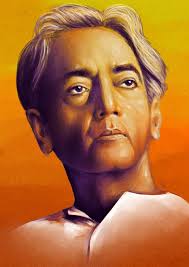Jiddu Krishnamurti: Exploring the Life and Philosophy of a Visionary
Jiddu Krishnamurti (1895-1986) was an Indian philosopher, speaker, and writer who profoundly impacted the world with his teachings on the nature of the mind, consciousness, and the path to true freedom. Known for his revolutionary approach to spirituality and psychology, Krishnamurti’s life and works have left a lasting legacy that continues to influence thinkers and seekers around the globe. He emphasized the importance of self-awareness, freedom from the constraints of society, and the necessity of inner transformation.
Early Life and History of Jiddu Krishnamurti
Jiddu Krishnamurti was born on May 12, 1895, in Madanapalle, a small town in southern India. His early life took a remarkable turn when, at the age of 14, he was “discovered” by The Theosophical Society, led by Annie Besant and Charles Leadbeater, who believed him to be the “world teacher” prophesied by their philosophy. Krishnamurti was groomed to be their leader and was raised in an environment that fostered spiritual development.
However, in 1929, after being declared the World Teacher, Krishnamurti famously renounced his ties with the Theosophical Society, rejecting all authority and organized belief systems. This act was a pivotal moment in his life and set the tone for his later teachings, which emphasized individual freedom and the need for personal insight.
Throughout his life, Krishnamurti traveled extensively, holding talks in various parts of the world. His discussions were often centered on the nature of human consciousness, the limitations of knowledge, and the destructive influence of thought patterns. His message was clear: true freedom and peace could only be found through self-inquiry and the dissolution of internal conflict.
Daily Life Impacts of Krishnamurti’s Teachings
Krishnamurti’s teachings had a profound influence on the lives of those who embraced them. He encouraged individuals to question their daily habits, beliefs, and assumptions, promoting an inner revolution that transcended traditional societal frameworks. One of the most significant impacts of Krishnamurti’s philosophy is the emphasis on living with awareness. He believed that daily life is an opportunity to observe oneself and break free from habitual thought patterns.
For many followers, Krishnamurti’s teachings led to a deeper understanding of the mind’s workings. His ideas have been life-changing for individuals seeking emotional freedom, inner peace, and liberation from the constraints of society. People who have embraced his philosophy report experiencing a shift in how they approach relationships, work, and personal challenges, often noting a sense of clarity and serenity in their everyday lives.
Significance and Observance of Jiddu Krishnamurti’s Legacy
Jiddu Krishnamurti’s legacy is not bound by religious or spiritual observances; instead, it revolves around the deep introspection of the mind and personal freedom. Krishnamurti did not promote any religious ritual, religious institution, or system of thought. Instead, his teachings encouraged individuals to observe their own minds, question the assumptions that shape their perceptions, and live authentically.
Krishnamurti’s significance lies in his ability to challenge conventional wisdom and provoke deep thought about human nature. His philosophy emphasized the need for inner freedom, which can only be achieved by understanding one’s own mind. He believed that external change could not occur without inner transformation.
While he did not advocate for a specific way of living, Krishnamurti’s teachings encourage mindfulness in every aspect of life. His followers often observe his teachings by practicing meditation, reflecting on their thoughts and actions, and living in a way that is unencumbered by societal conditioning.
Key Facts About Jiddu Krishnamurti
- Non-Dualistic Approach: Krishnamurti rejected the idea of dualities such as good and bad, right and wrong, believing that they were constructs of the mind that caused division and conflict.
- Focus on Self-Understanding: His core message was that true freedom comes from understanding oneself and being free from psychological patterns, rather than relying on external teachings or beliefs.
- Global Influence: Krishnamurti’s talks were held in many parts of the world, including the United States, Europe, and India. His ideas reached a diverse audience, influencing thinkers, educators, and spiritual seekers alike.
- The Krishnamurti Schools: Krishnamurti founded schools in India, the UK, and the USA where education was focused not only on intellectual development but also on the holistic growth of students through self-awareness and inquiry.
- Books and Writings: Krishnamurti authored numerous books, including The First and Last Freedom, Commentaries on Living, and Freedom from the Known, which remain popular among those interested in philosophy, psychology, and spirituality.
FAQs About Jiddu Krishnamurti
Q: Did Jiddu Krishnamurti promote a specific religion?
A: No, Krishnamurti did not align himself with any specific religion. His teachings transcended religious boundaries, focusing on personal insight and freedom from conditioning.
Q: How can Krishnamurti’s teachings help in daily life?
A: His teachings encourage mindfulness, self-inquiry, and a deep understanding of the mind. Practicing these principles can lead to a more peaceful and authentic life.
Q: What was Krishnamurti’s view on meditation?
A: Krishnamurti viewed meditation as a process of observing the mind without judgment or attachment. It was a way to understand the thought process and gain insight into the nature of consciousness.
Q: What is the importance of Jiddu Krishnamurti’s philosophy today?
A: In today’s fast-paced, often chaotic world, Krishnamurti’s philosophy offers a way to achieve inner peace, clarity, and freedom by transcending societal conditioning and psychological conflict.
Why Jiddu Krishnamurti’s Teachings Are Important to Society
Jiddu Krishnamurti’s insights are crucial in today’s society, where people often feel trapped by their thoughts, societal expectations, and external pressures. His teachings encourage individuals to break free from these constraints and live with full awareness. In a world that is increasingly fragmented and conflict-ridden, Krishnamurti’s message of inner peace, self-understanding, and freedom resonates deeply. By fostering greater self-awareness, his teachings offer a pathway to not only individual transformation but also collective peace.
In conclusion, Jiddu Krishnamurti’s teachings have the power to change the way we live, think, and interact with the world. His philosophy invites us to question the status quo, embrace inner freedom, and live authentically. His legacy continues to inspire those who seek to understand the deeper nature of reality and our place within it.










